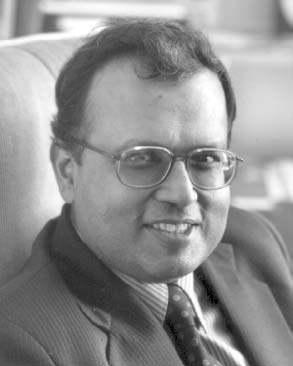Career
Nambisan conducts research in the areas of innovation management, technological entrepreneurship, technology strategy, and social innovation. His articles have appeared in several management journals including Harvard Business Review, MIT Sloan Management Review, Stanford Social Innovation Review, Management Science, Organization Science, and Academy of Management Review.
Nambisan is the author of "The Global Brain: Your Roadmap for Innovating Faster and Smarter in a Networked World", [1] which applies the concept of Global brain to management and focuses on global innovation networks. An article based on this book appeared in Harvard Business Review. [2]
Nambisan (along with Mohanbir Sawhney of Northwestern University) coined the term Innovation capitalist to describe a new type of innovation intermediary. [3]
He is also credited with introducing the concept of Virtual customer environment that describes Web-based forums for customer co-innovation and value co-creation. His publications on this topic has appeared in several academic journals such as Academy of Management Review, [4] MIT Sloan Management Review, [5] and Organization Science [6]
Prior to joining CWRU, he was Professor of Entrepreneurship and Technology Management at the Lubar School of Management, University of Wisconsin–Milwaukee and Professor of Technology Management & Strategy at the Lally School of Management, Rensselaer Polytechnic Institute.

The MIT Sloan School of Management is the business school of the Massachusetts Institute of Technology, a private university in Cambridge, Massachusetts. MIT Sloan offers bachelor's, master's, and doctoral degree programs, as well as executive education. Its degree programs are among the most selective in the world. MIT Sloan emphasizes innovation in practice and research. Many influential ideas in management and finance originated at the school, including the Black–Scholes model, the Solow–Swan model, the random walk hypothesis, the binomial options pricing model, and the field of system dynamics. The faculty has included numerous Nobel laureates in economics and John Bates Clark Medal winners.
User innovation refers to innovation by intermediate users or consumer users, rather than by suppliers. This is a concept closely aligned to co-design and co-creation, and has been proven to result in more innovative solutions than traditional consultation methodologies.
Michael A. Cusumano is the Sloan Management Review Distinguished Professor and Deputy Dean at the MIT Sloan School of Management. Previously he held a joint appointment in the MIT School of Engineering, Division of Engineering Systems. Professor Cusumano specializes in strategy, product development, and entrepreneurship in computer software as well as automobiles and consumer electronics. At MIT, he has recently taught Platform Strategy & Entrepreneurship as well as Strategy & the CEO. During 2016–17, he was on leave as Special Vice President and Dean of Entrepreneurship and Innovation Initiatives at Tokyo University of Science, where he founded the Tokyo Entrepreneurship and Innovation Center and designed a new mid-career Management of Technology curriculum as well as a new business school that merged the Graduate School of Innovation and the School of Management.
The MIT Entrepreneurship Center is one of the largest research and teaching centers at the MIT Sloan School of Management, the business and management school at the Massachusetts Institute of Technology. It was founded in the early 1990s and charged with the mission to develop MIT's entrepreneurial activities and interests in education and research, alliances, and the community.
Open innovation is a term used to promote an information age mindset toward innovation that runs counter to the secrecy and silo mentality of traditional corporate research labs. The benefits and driving forces behind increased openness have been noted and discussed as far back as the 1960s, especially as it pertains to interfirm cooperation in R&D. Use of the term 'open innovation' in reference to the increasing embrace of external cooperation in a complex world has been promoted in particular by Henry Chesbrough, adjunct professor and faculty director of the Center for Open Innovation of the Haas School of Business at the University of California, and Maire Tecnimont Chair of Open Innovation at Luiss.

Alex Paul "Sandy" Pentland is an American computer scientist, the Toshiba Professor of Media Arts and Sciences at MIT, and serial entrepreneur.

Amar Gupta is an Indian computer scientist based in the United States. Gupta has worked in academics, private companies, and international organizations in positions that involved analysis and leveraging of opportunities at the intersection of technology and business, as well as the design, development, and implementation of prototype systems that led to widespread adoption of new techniques and technologies. He has surmounted several strategic, business, technical, economic, legal, and public policy barriers related to several innovative products and services.
A Virtual Customer Environment (VCE) is a web forum to facilitate customer co-innovation or user innovation.
George Yip is Emeritus Professor of Marketing and Strategy at Imperial College Business School, London. Former professor and Co-Director of the Centre on China Innovation at China Europe International Business School (CEIBS). Other academic positions at Harvard, Georgetown, UCLA, Cambridge, London Business School. Now living in Boston and Maine, USA, and London. Former Dean of Rotterdam School of Management, Erasmus University. His book, Total Global Strategy: Managing for Worldwide Competitive Advantage was selected as one of the 30 best business books of 1992 by Soundview Executive Book Summaries. Also, author or co-author of Pioneers, Hidden Champions, Change Makers, and Underdogs: Lessons from China's Innovators (2019), China’s Next Strategic Advantage: From Imitation to Innovation (2016), Strategic Transformation (2013), Asian Advantage: Key Strategies for Winning in the Asia-Pacific Region (1998), and Total Global Strategy. Over 10,000 citations on Google Scholar. He serves on the editorial advisory boards of California Management Review, LRP and MIT Sloan Management Review. Boards of Hewnoaks Artist Colony (Maine) and MassOpera and Board of Advisors of Boston Lyric Opera. Chair of Research Advisory Committee, SKEMA Business School, France. Former board member of IDM, Glunz AG, Arlington Capital Management and Data Instruments, Inc., former advisory board member of Sonae SGPS and American University of Cairo Business School
The Arrow information paradox, and occasionally referred to as Arrow's disclosure paradox, named after Kenneth Arrow, American economist and joint winner of the Nobel Memorial Prize in Economics with John Hicks, is a problem faced by companies when managing intellectual property across their boundaries. It occurs when they seek external technologies for their business or external markets for their own technologies. It has implications for the value of technology and innovations as well as their development by more than one firm, and for the need for and limitations of patent protection.

Gina Colarelli O'Connor is Professor of Innovation Management at Institut Universitaire de France, where she has worked since January 2019. She leads Babson's executive education programs in corporate innovation.
Innovation management is a combination of the management of innovation processes, and change management. It refers to product, business process, marketing and organizational innovation. Innovation management is the subject of ISO 56000 series standards being developed by ISO TC 279.
Mohanbir Sawhney is a management consultant, author and academic. He is the Associate Dean, Digital Innovation at McCormick Foundation Chair of Technology, Clinical Professor of Marketing and the Director of the Center for Research in Technology & Innovation at the Kellogg School of Management. He is an adviser to several large organizations on e-commerce strategies.

Marco Iansiti is a professor at the Harvard Business School, whose primary research interest is technology and operations strategy and the management of innovation. He is the David Sarnoff Professor of Business Administration, heads the Technology and Operations Management Unit, and chairs the Digital Initiative. He is also the Chairman of the Board of Keystone Strategy, a consultancy focused on strategy, data sciences and economics for technology clients.

Georg von Krogh is a Norwegian organizational theorist and Professor at the Swiss Federal Institute of Technology in Zurich and holds the Chair of Strategic Management and Innovation. He also serves on Strategy Commission at ETH Zurich.

Geoffrey G Parker is a scholar whose work focuses on distributed innovation, energy markets, and the economics of information. He co-developed the theory of two-sided markets with Marshall Van Alstyne.
Bill Aulet is the Managing Director of the Martin Trust Center for MIT Entrepreneurship at MIT and Professor of the Practice at the MIT Sloan School of Management and MIT Sloan Executive Education. He is also the author of Disciplined Entrepreneurship: 24 Steps to a Successful Startup.
Michael L. Tushman is an American organizational theorist, management adviser, and Professor of Business Administration at Harvard Business School. He is known for his early work on organizational design with David A. Nadler, and later work on disruptive innovation, organizational environments, and organizational evolution. He is also co-founder and director of Change-Logic, a consulting firm based in Boston, US.
Julian Birkinshaw is a British academic. He is Professor of Strategy and Entrepreneurship at the London Business School, where he is the Academic Director of the Deloitte Institute of Innovation and Entrepreneurship. He is the author of four books on management.

Dame Fiona Elizabeth Murray is the Associate Dean for Innovation at the MIT Sloan School of Management. She is a member of the Prime Minister of the United Kingdom's Council for Science and Technology.







